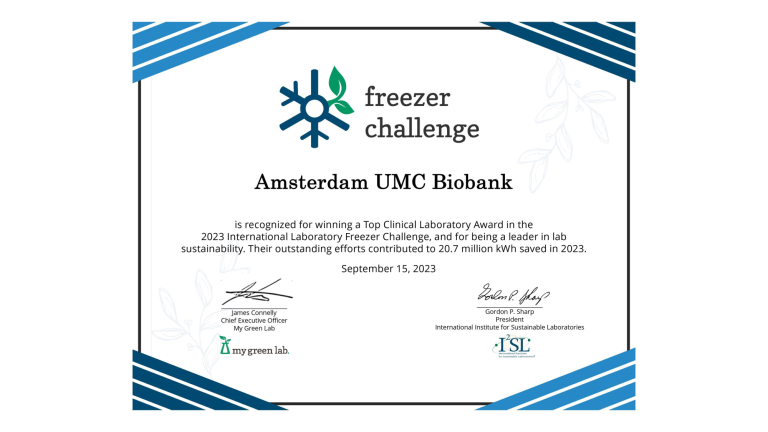Zero growth
Amsterdam UMC considers the responsible use of natural resources as part of its commitment to a healthier world. At times of climate change and energy shortage, we propose a zero growth scenario for the storage of biological materials at ultra-low temperature. This means that central freezer areas will not expand further and that the number of freezers will be limited. To this end, the building up of new collections and the phasing out of old collections that are no longer used or of lesser scientific value need to reach an equilibrium. The first measure to achieve this goal is consistent compliance with the permitted storage period for collections. In the long term, the actual use could be included in determining the storage period of collections. The central Biobank is taking the lead in this transition process.
Freezer Challenge
The International Laboratory Freezer Challenge (Freezer Challenge) is a free annual competition designed to promote best practices in cold storage management. The Freezer Challenge aims to stimulate laboratories all over the world to reduce their energy consumption by, for example, increasing the setpoint of ultra-low temperature freezers from -80°C to -70°C or by cleaning out the freezers.
Resetting just two ultra-low temperature freezers to -70°C saves as much electricity as an average Dutch household consumes on an annual basis (2,500 kWh). Nevertheless, such a step raises questions. Mostly about the safety and long-term quality of the valuable bodily materials, which are stored for future scientific research. Various studies have shown that biological material remains just as stable at -70°C as they do at -80°C, see this document. Another aspect is the shorter response time to technical defects, yet with the current emergency procedures, the Biobank also considers this risk acceptable.
Starting at October 1, 2022 the Biobank increased the setpoint of over 80 ultra-low temperature freezers from -80°C to -70°C for at least half a year. As we did not face more (severe) incidents, we decided to make this change permanent as of April 1, 2023.
The saving of more than 650,000 kWh per year (the average annual energy consumption of 262 households) earned the Biobank the 'Top Biorepository Award - Clinical Award' 2023 of the Freezer Challenge 2023!
To learn more about our contribution to the Freezer Challenge, listen to this podcast recorded by BBMRI-ERIC.

Per May 2024, -70°C has become the new setpoint for all ultra-low temperature freezers in Amsterdam UMC. This setpoint will be installed during the annual maintenance of the freezers with the clear understanding that motivated exceptions will be approved.
